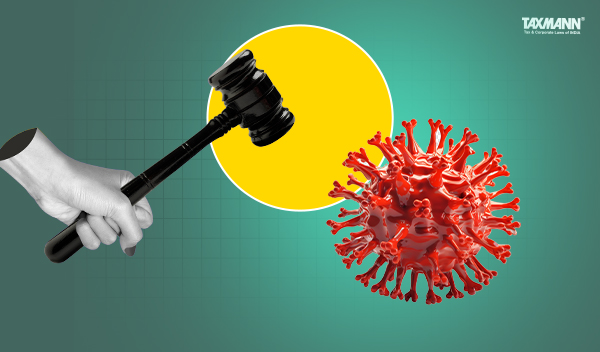NCLAT Upholds Plea u/s 95 as Timely Filed Due to Debt Acknowledgment and SC’s Exclusion of COVID Period
- News|Blog|Insolvency and Bankruptcy Code|
- 3 Min Read
- By Taxmann
- |
- Last Updated on 24 September, 2024

Case Details: Jagdishchandra Mansukhani v. STCI Finance Ltd. - [2024] 166 taxmann.com 490 (NCLAT-New Delhi)
Judiciary and Counsel Details
- Ashok Bhushan, Chairperson, Barun Mitra & Arun Baroka, Technical Member
- Atul Singh & Ms Mitika Agrawal, Advs. for the Appellant.
- Ms Ferzana Behramkamdin, Ms Surekha Raman, Ms Bharti Bhansali & Ms Riya Seth, Advs. for the Respondent.
Facts of the Case
In the instant case, the financial creditor granted a short-term loan to the principal borrower, in which the appellant stood as a guarantor. After a notice demanding repayment was issued, the financial creditor filed an application u/s 95 of the IBC for insolvency proceedings against the personal guarantor.
Meanwhile, the appellant filed an execution application before the NCLT sought dismissal of the petition, arguing it was time-barred as the debt defaulted on 1-3-2017, and the petition was filed on 30-9-021, exceeding the three-year limitation period.
The NCLT vide the impugned order held that the letter dated 12-6-2017 issued by the personal guarantor admitting debt started a fresh period of limitation from 12.06.2017. Thus, the petition having been filed on 30.09.2021 was within the limitation period, in view of the judgment of the Supreme Court in Cognizance for Extension of Limitation, In re, in which period from 15-3-2020 to 25-3-2021 was excluded in computing period of limitation and, therefore, petition filed under section 95 was to be admitted.
Aggrieved by the NCLT’s order, the appellant filed an instant appeal before the National Company Law Appellate Tribunal (NCLAT).
It was noted that the appellant issued a letter dated 12-6-2017 in response to the notice dated 01-6-2017, issued by financial creditor u/s 13(2) of the IBC. Further, it was noted that the said letter was in response to the notice, and it was clear that said Letter contained a clear acknowledgement of debt, mentioning that borrowers were in discussion with lenders and the loan would be shortly closed and further request was made to grant time till 31.07.2017.
The NCLAT observed that the said letter clearly contained an acknowledgement of debt, and the NCLT did not commit any error in giving the benefit of section 18 of the Limitation Act.
NCLAT Held
The NCLAT held that since the letter dated 12.06.2017 was treated as an acknowledgement, the three-year Limitation would have expired on 11.06.2020, and the period from 15.03.2020 to 25.03.2021 was directed to be excluded by the Supreme Court in its order in Suo Motu Writ Petition No. 03/2020.
Thus, an application filed on 30.09.2021 was well within time, and the NCLT rightly overruled the appellant’s objection that the application was barred by time. Therefore, the impugned order passed by the NCLT, holding that the application was well within time, was justified.
List of Cases Reviewed
- Order passed by NCLT, in I.A. No. 969/2023 in C.P. (IB) No. 1264/MB/2021, dated 07.06.2024 [2024] 166 taxmann.com 449 (para 13) affirmed.
- ‘Laxmiratan Cotton Mills Company Ltd.’ v. ‘Aluminium Corp. of India Ltd.’ (1971) 1 SCC 67 (para 9)
- Cognizance for Extension of Limitation, In re [2022] 134 taxmann.com 307 (SC) (para 12) followed.
List of Cases Referred to
- ‘Laxmi Pat Surana’ v. ‘Union Bank of India & Anr.’, (2021) 8 SCC 481 (para 8)
- ‘Laxmiratan Cotton Mills Company Ltd.’ v. ‘Aluminium Corp. of India Ltd.’ (1971) 1 SCC 67 (para 9).
Disclaimer: The content/information published on the website is only for general information of the user and shall not be construed as legal advice. While the Taxmann has exercised reasonable efforts to ensure the veracity of information/content published, Taxmann shall be under no liability in any manner whatsoever for incorrect information, if any.

Taxmann Publications has a dedicated in-house Research & Editorial Team. This team consists of a team of Chartered Accountants, Company Secretaries, and Lawyers. This team works under the guidance and supervision of editor-in-chief Mr Rakesh Bhargava.
The Research and Editorial Team is responsible for developing reliable and accurate content for the readers. The team follows the six-sigma approach to achieve the benchmark of zero error in its publications and research platforms. The team ensures that the following publication guidelines are thoroughly followed while developing the content:
- The statutory material is obtained only from the authorized and reliable sources
- All the latest developments in the judicial and legislative fields are covered
- Prepare the analytical write-ups on current, controversial, and important issues to help the readers to understand the concept and its implications
- Every content published by Taxmann is complete, accurate and lucid
- All evidence-based statements are supported with proper reference to Section, Circular No., Notification No. or citations
- The golden rules of grammar, style and consistency are thoroughly followed
- Font and size that’s easy to read and remain consistent across all imprint and digital publications are applied



 CA | CS | CMA
CA | CS | CMA
